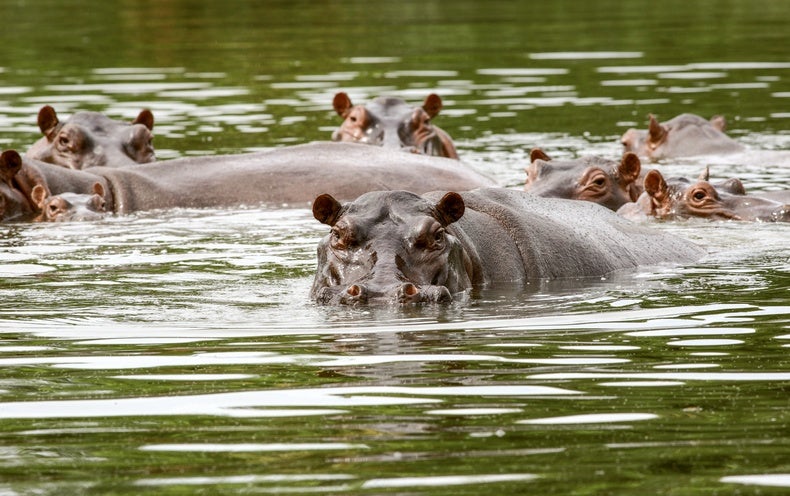Colombian environment minister Susana Muhamad has triggered fear among researchers that she will protect, rather than reduce, a growing population of invasive hippos that threaten the country’s natural ecosystems and biodiversity. Although she did not directly mention the hippos — a contentious issue in Colombia — Muhamad said during a speech in late January that her ministry would create policies that prioritize animal well-being, including the creation of a new division of animal protection.
The hippos escaped from drug-cartel leader Pablo Escobar’s estate after he died in 1993. Left alone, the male and three females that Escobar had illegally imported from a US zoo established themselves in Colombia’s Magdalena River and some small lakes nearby — part of the country’s main watershed. After years of breeding, the ‘cocaine hippos’ have multiplied to about 150 individuals, scientists estimate.
Given that the hippos (Hippopotamus amphibius) — considered the largest invasive animal in the world — have no natural predators in Colombia and have been mating at a steady rate, their population could reach 1,500 in 16 years, according to a modelling study published in 2021. “I do not understand what the government is waiting for to act,” says Nataly Castelblanco Martínez, a Colombian conservation biologist at the Autonomous University of Quintana Roo in Chetumal, Mexico, and co-author of the study. “If we don’t do anything, 20 years from now the problem will have no solution.”
Researchers have called for a strict management plan that would eventually reduce the wild population to zero, through a combination of culling some animals and capturing others, then relocating them to facilities such as zoos. But the subject of what to do with the hippos has polarized the country, with some enamoured by the animals’ charisma and value as a tourist attraction and others concerned about the threat they pose to the environment and local fishing communities.
‘A bit surreal’
Several studies and observations suggest how destructive it could be to allow the Colombian hippo population to explode. A 2019 paper, for example, showed that, compared with lakes without hippos, those where the animals have taken up residence contain more nutrients and organic matter that favour the growth of cyanobacteria — aquatic microbes associated with toxic algal blooms. These blooms can reduce water quality and cause mass fish deaths, affecting local fishing communities.
Other scientists have predicted that the hippos could displace endangered species that are native to the Magdalena River, such as the Antillean manatee (Trichechus manatus manatus), by outcompeting them for food and space. They caution that traffic accidents and attacks on people caused by the hippos will become more common. And they warn that wildlife traffickers are already taking advantage of the situation by illegally selling baby hippos — a trend that could intensify.
“It’s a bit surreal,” says Jorge Moreno Bernal, a vertebrate palaeontologist at the University of the North in Barranquilla, Colombia. “This is just a taste of what may come.”
When Colombian authorities first recognized the speed at which the hippo population was growing, during the 2000s, they acted to reduce their numbers. But in 2009, when photos appeared online after soldiers gunned down Pepe, Escobar’s fugitive male hippo, the outcry from animal-rights activists and others plunged the environment ministry into an “institutional paralysis”, says Sebastián Restrepo Calle, an ecologist at Javeriana University in Bogotá.
Researchers say that the hippos don’t belong in Colombia — they are native to sub-Saharan Africa. Simulations run by Castelblanco Martínez and her colleagues suggest that to reduce the population to zero by 2033, about 30 hippos would need to be removed from the wild population per year. No other course of action, including sterilization or castration, would eradicate them, according to the modelling of various management scenarios, says Castelblanco Martínez.
The cost of inaction
The worry now is that, instead of basing decisions on evidence and expertise in conservation, the government is listening to popular opinion, says Restrepo Calle. Neither Muhamad nor representatives of the environment ministry replied to Nature’s requests for comment.
“Why prioritize one species over our own ecosystems?” — especially a species that isn’t native, asks Alejandra Echeverri, a Colombian conservation scientist at Stanford University in California. Along with her colleagues, Echeverri published a study last month showing that Colombia has few policies governing invasive species compared with its overall number of biodiversity policies.
Animals-rights advocates, meanwhile, argue that they aren’t ignoring environmental concerns. Luis Domingo Gómez Maldonado, an animal-rights activist and specialist in animal law at Saint Thomas University in Bogotá, says “It’s not about saving the hippos on a whim,” but rather about solving the issue while also giving the hippos justice. “My indisputable position is: let’s save as many individuals as possible, let’s do it ethically.”
Researchers, too, say they have the animals’ best interests at heart. “Even if [advocates] don’t see it, we care about the hippos,” Castelblanco Martínez says. “The more time that passes, the more hippos will either have to be culled, castrated or captured.”
The question is whether environmental authorities will act swiftly to draft and enforce a management plan that is both ethical and effective. Should they sit on the issue for too long, Castelblanco Martínez warns, rural communities that are most affected by the hippos might take matters into their own hands.
If the government doesn’t cull them, she says, people will use shotguns to do it.
This article is reproduced with permission and was first published on March 2, 2023.

